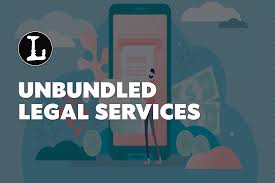
Want to obtain limited legal advice and consultation without paying thousands of dollars or more for drawn out legal representation? A possible option, available in some but not all situations, is “unbundled” legal service. Much is being written on the subject these days. See, for instance, a wonderful piece written by North Carolina attorney Stephanie Kimbro on The Ethics of Unbundling in the October 2011 issue of the ABA online publication, GPSolo ereport. Ms. Kimbro, who has received awards for providing effective online legal support to clients, advises that “unbundled legal services should not be confused with automated legal-document assembly or blank legal forms for sale. Unbundling,” she comments, “requires the lawyer to guide the client through the limited legal process and instruct the client on handling certain tasks without the lawyer being involved in all aspects of the legal matter. For example, the client might execute and file a document at the courthouse or attend a hearing alone after the attorney has prepared the document and provided prehearing counseling.”
Both the Mississippi and Florida Rules of Professional Conduct allow “unbundling.” MRPC 1.2 (c) states that “a lawyer may limit the objectives or scope of representation if the limitation is reasonable under the circumstances and the client gives informed consent.” Florida Rule of Professional Conduct 4-1.2(c) says the same thing, but adds that the informed consent must be in writing. Legal services, unbundled or not, must always be provided with competence, thoroughness, and preparation (as to unbundled services, preparation within agreed limits).
Of course, there are certainly risks. Ask anyone who has tried to represent himself or herself in a lawsuit. Nevertheless, obtaining “unbundled” legal assistance may be better than obtaining none at all. For both attorney and client, fees may be reduced because the attorney is eliminating expenses related to portions of the legal work. The key is to understand the benefits and risks by asking the attorney to explain each of those thoroughly and to capture the explanation in writing.
Stephanie Kimbro comments, “The practice of unbundling is not appropriate for every client or every legal problem. However, when handled correctly, the practice provides greater access to justice for individuals who otherwise might not seek full-service legal representation.”




